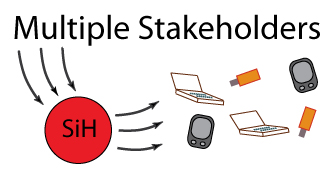
Haiti Pilot
Introduction and Overview
The Haiti health care education system, which has always faced challenges in terms of resources and capacity, as significantly affected by the 2010 earthquake. Rebuilding efforts occurring with international help have allowed new concepts and methods of education to be explored.
The stakeholders in health care education and delivery in Haiti are many, and it will be important to engage a number of these in order to maximize impact. These include medical schools, nursing schools, midwifery schools, governmental organizations, and non-govermental organizations (NGOs).
SharingInHealth (SiH) has an increasingly complete collection of content available, and is now beginning to include cases that are specific for Haitian needs, resources, and culture. We are exploring ways to see these cases written by learners, educators, and clinicians in Haiti. These resources will be freely shared online, but may also be loaded onto low-cost computing devices for use in internet-poor situations.
Vision and Objectives
This project aims to increase the training capacity for primary health care in Haiti by equipping students and educators, both local and international, with effective, accessible resources.
Our objectives are to:
- develop relationships with a variety of health care students, educators, and clinicians in Haiti,
- identify the top 100 health concerns faced by primary health care providers in Haiti,
- ensure these topics are written and reviewed in SharingInHealth.ca in English,
- write Haiti-specific cases for these topics in English,
- develop a framework for translation into French in 2012, and
- work with organizations to provide low-cost laptops and tablet computers to partner NGOs and educational institutions.
Potential Stakeholders
Educational InstitutionsHaiti has four medical schools, including:
Haiti has a number of nursing schools, including: There are an number of international institions involved with health care education in Haiti, including: |
Non-Governmental OrganizationsThere are many faith-based and non-religious organizations assisting in Haiti. Some of these include:
|
Resource Creation and Use

What to author?
We are working hard to create content that is globally relevant, and this process continues to unroll with authors and reviewers from around the world.
We are looking to create cases specific for the context of primary care in Haiti. Relevant topics will be identified during May-Sept of 2011, and we hope to have 15029 cases created by Nov 2011.
Who to author?
A number of stakeholders will be approached to author and review cases. This will include Haitian health care students, educators, and clinicians. Appropriate NGO staff with experience in Haiti may also be involved.
How to author?
Once relevant case topics are identified, contributors will be able to select from amongst them. As quality cases are produced, the topic will be removed from the 'to be written' list. Cases will initially be written in English, with translation to French to follow in late 2011/early 2012.
We have a developed processes for authoring and review, and have administrative support to facilitate this. All that is required is email access.
Where do resources go?
Once a topic or a case is written and reviewed, it is put online by SiH admininstration for open-access use. Cases may be viewed online, or can be downloaded for internet-independent use.
As cases are completed, we will be creating 2-3 recommended, customizable curricula. Institutions and institutions can adopt or adapt these as they see fit to meet their specific needs.
Technology
SiH is primarily focused on educational software, and we seek to partner with organizations who can fund and provide hardware which is affordable and portable. Principal options include netbooks, tablets, and smart phones, all which could be internet independent and powered by solar panels as needed.
For our May pilot, we will be bringing two netbooks and one or two tablets, all pre-loaded with the SiH site, to pilot in terms of efficacy and scalability.
Muti-Use Scenarios
- Haitian students
- Haitian educators
- international students
- international clinicians
Haitian students
SiH is currently designed to be one of many resources, though could become a Haitian student's primary resource by 2012. Some students may have their own computer or tablet, but it is likely that groups of 3-6 students will share a device, with each student having their own USB stick. This will facilitate small-group learning.
Haitian educators
Readily available resources for students will mean educators/clinicians will need to spend less time teaching the foundations ,or preparing teaching materials, and will be able to focus more on clinical application and practice.
Resources include:
- how to facilitate a small group
- how to provide clinical supervision
- how to provide feedback
The small group learning format will increase the student:teacher ratio.
Educators will also be able to use these resources themselves for their clinical practice.
International Students
SiH cases, specific for the Haiti context, will make excellent preparation for students travelling to Haiti. As well, we will recommend a variety of devices to consider bringing as a textbook for reference, preloaded with cases and content.
International Clinicians
Similarly as for students, SiH cases, specific for the Haiti context, will make excellent preparation for clinicians travelling to Haiti. As well, we will recommend a variety of devices to consider bringing, preloaded with SiH cases and content.
Teaching of Haitian learners is one of the key roles for international clinicians, and we will greatly reduce the prep work required for this. As with Haiti educators, important SiH resources will include:
- how to facilitate a small group
- how to provide clinical supervision
- how to provide feedback
Timeline 2011
May
June-Sept
|
Nov
|
